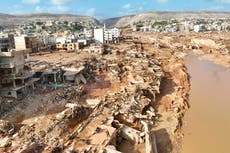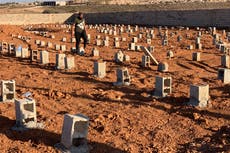Climate crisis made devastating Libya flooding ‘50 times more likely’
Floods like the one in Greece and Libya now ‘reasonably common’ due to climate crisis, study finds
The devastating floods in Libya that killed 11,000 people this month were made “50 times more likely” due to the man-made climate crisis, a scientific assessment has found.
The catastrophic floods were caused by the collapse of two dams in Derna after a storm hit the country on 10 September. However, the climate crisis played a role behind the heavy rainfall, researchers have said.
The report, a rapid attribution study which finds the causes behind a disaster, was published by researchers from World Weather Attribution (WWA) on Tuesday.
Scientists from WWA studied the impact of Storm Daniel and the incessant rainfall in the Mediterranean region in recent weeks to understand how increasing global average temperatures have played a role.
The study found the climate crisis made the heavy rainfall in Greece, Bulgaria and Türkiye up to 10 times more likely, while in Libya it was made up to 50 times more likely.
The report also noted that in Libya a major reason behind the event turning into a humanitarian disaster was the country’s crumbling infrastructure, itself the result of civil strife since 2011.
Researchers said Storm Daniel, which formed in the Eastern Mediterranean in September, brought large amounts of rain over a 10-day period to several countries, including Spain, Greece, Bulgaria and Libya.
“This devastating disaster shows how climate change-fueled extreme weather events are combining with human factors to create even bigger impacts, as more people, assets and infrastructure are exposed and vulnerable to flood risks,” said Julie Arrighi, director at the Red Cross Red Crescent Climate Centre.
“However, there are practical solutions that can help us prevent these disasters from becoming routine such as strengthened emergency management, improved impact-based forecasts and warning systems, and infrastructure that is designed for the future climate.”
To quantify the effect of climate change on the heavy rain in the region, scientists analysed climate data and computer model simulations to compare the climate as it is in current times – after about 1.2C of global warming – to the climate of the past in the late 1800s, using peer-reviewed methods.
Scientists divided their analysis in three regions: Libya, where it focused on the northeast part of the country where most of the rainfall fell; Greece, Bulgaria and Turkey, where the analysis looked at maximum rainfall over four consecutive days; and Spain, where most of the rain fell in just a few hours.
For this large region that encompassed parts of three countries, the event is now reasonably common, and can be expected about once every 10 years, meaning it has a 10 per cent chance of happening each year.
For central Greece, where most of the impacts took place, the event is less probable and only expected to happen once every 80-100 years, equivalent to a 1-1.25 per cent chance of happening each year.
In Spain, where most of the rain fell in just a few hours, scientists estimated such heavy rainfall is expected once every 40 years, but could not conduct a full attribution analysis because available climate models poorly represented heavy rainfall on timescales shorter than a day.
For Libya, they found the climate crisis made the event up to 50 times more likely to happen, with up to 50 per cent more rain during the period as a result of man-made pollution.
The event is still extremely unusual, the report says, and can only be expected to occur around once in 300-600 years in the current climate.
While WWA scientists said these results have large uncertainties due to lack of weather data from Libya, the role of the climate crisis was found in earlier assessments too, in making rainfall associated with storms heavier and more disastrous, especially for vulnerable countries.
“After a summer of devastating heatwaves and wildfires with a very clear climate change fingerprint, quantifying the contribution of global warming to these floods proved more challenging,” said Friederike Otto, co-founder of WWA and senior lecturer in climate science at Grantham Institute in Imperial College London.
“But there is absolutely no doubt that reducing vulnerability and increasing resilience to all types of extreme weather is paramount for saving lives in the future.”
Join our commenting forum
Join thought-provoking conversations, follow other Independent readers and see their replies
Comments


Bookmark popover
Removed from bookmarks